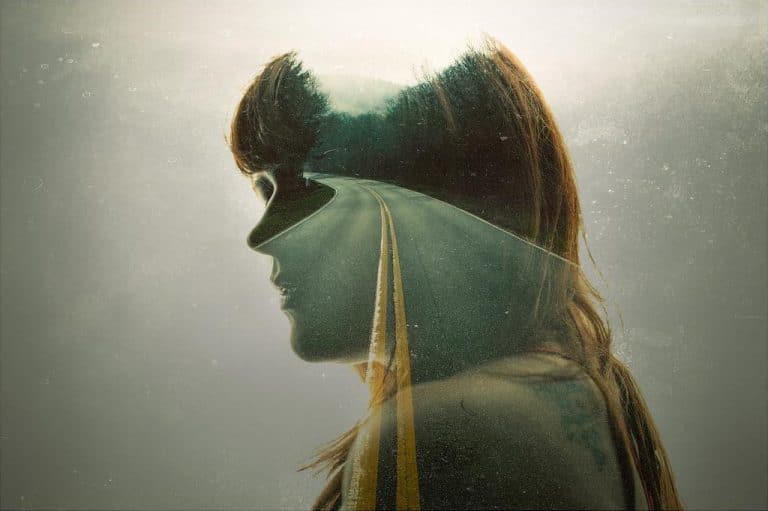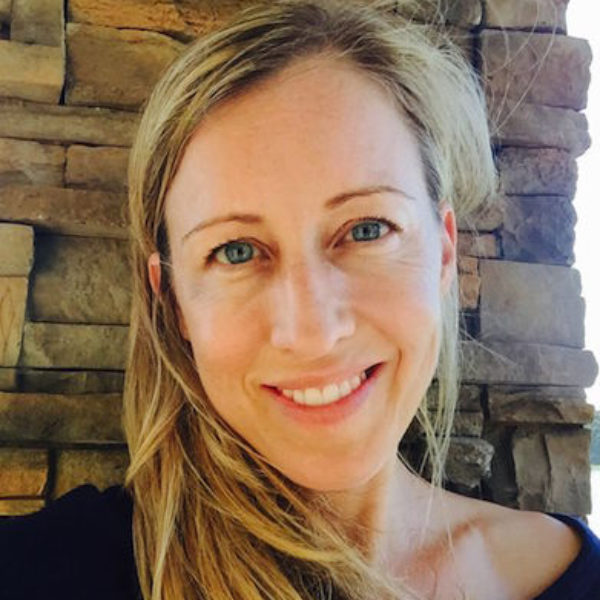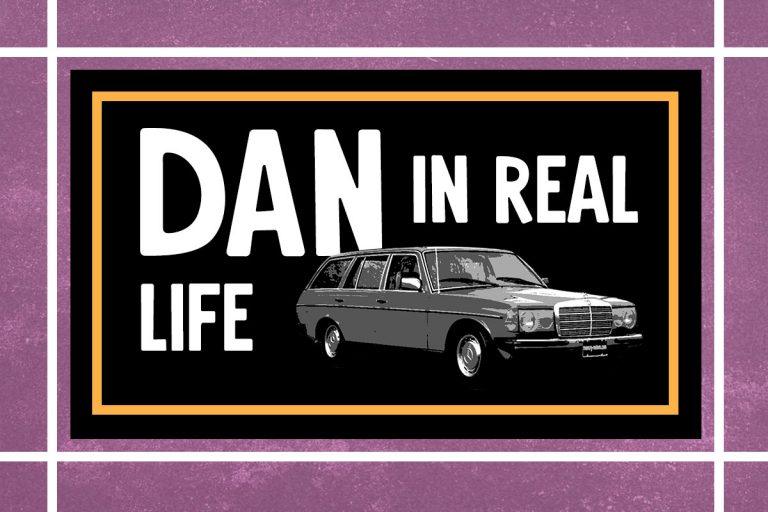
Image by Brandon Kidwell, © All Rights Reserved.
My Family Is an Arranged Constellation
“And so we came forth, and once again beheld the stars.”
—Dante’s Inferno & William Styron’s Darkness Visible
The decision was mine. I’d chosen a Labor Day family vacation to Palm Springs because it was easy, close by and — since there was a massive heat wave — cheap. I drove the 129 miles from Los Angeles with two teenage daughters in the backseat. We’d picked their dad up along the way, from where he lived in Newport Beach, and he sat in the passenger seat as I drove, a floppy straw hat on his head.
Pacific Ocean in the rearview, mountains ahead, green patches of lawns and fruit orchards dotting the dusty landscape. How water can be manipulated to make things grow where they shouldn’t. My focus, the highway pointed due east; the girls, their phones. Their dad insisted on the radio, turning the dial from static to station until he found something he liked. “Yes,” he said as the electronic drums and familiar riff to “Good Vibrations” by Marky Mark and the Funky Bunch started up. A song from our college years when we’d first met. The girls groaned as he started to sing along. I couldn’t help it, joining in, and soon we were all laughing.
We pulled into a resort which since 1926 has touted itself as the “personal refuge for Hollywood luminaries.” One thousand acres of adobe casitas, pools, golf courses. The ultimate desert hideaway. In the lobby, tan men in white suits crowned us with flower leis, took our luggage in exchange for cold water infused with fresh fruit. I went to the reservation desk and the woman who checked us in was confused. “Two separate bungalows for your family?” she asked.
“Yes,” I said.
“But we can easily accommodate you all in one—”
“Separate. Please.” The moment I always dreaded. Having to explain our family’s . . . situation. Usually I said divorced.
She held her mouth in a tight line, the forced banality of hospitality, and said “Of course” as she slid two keys towards me.
Then the four of us walked across the lush grounds and the girls and I went to our place and their dad went to his and we settled into the arrangement of the broken family we’d become.
We hadn’t vacationed together in over a decade. Our last trip, a summer week on Cape Cod, when we still lived in Connecticut. Cozy rental cottage, oysters, snuggling around a bonfire on the National Seashore. Setting out towels and buckets and shovels for a day at the beach like all the other families. The girls burying their dad in the sand up to his neck. Now we live apart, having moved across the country. First me and the girls, then him, our houses separated by 45 miles of California highway.
You get lots of advice when your marriage falls apart. Some tell you to leave. Most tell you to stay. The other anguished women in my divorce support group with their foreboding tales: hiding cash in the back of underwear drawers; tailing husbands to new girlfriends’ apartments; battles waged in front of small children; blocking and stalking in social media spaces; cutting of skin; drowning in booze. The expulsion of energy at the end of things is incalculable. But after a decade of marriage, after putting him through medical school, after moving to the coveted suburbs of the Golden Coast of Connecticut, and despite wanting to hold onto the dream of mother-of-two-married-to-a-doctor, I could see, feel, that staying together was impossible.
My husband refused to deal with his diagnosis of bipolar disorder. Underreporting to psychiatrists, pretending to be sane, but his illness raged on. Staying up for nights on end, writing screenplays of his life, a man who never once raised his voice now threatening me in his aggressive morning mania, hospitalizations after two bouts of almost-suicide. And even then, after all that, “I’ll be anything but bipolar,” he said.
My instincts, long dulled, started firing again, and like a fisherman loosening the silk knots of his tangled net, I undid it all. I became the person who breaks a family apart. The one who says no when her husband calls in the wee hours of the morning and weeps, begs into the phone, “Please, let me come home.” Do you know what sounds your five- and seven-year-old daughters make when you have to tell them their father is never coming home? Like peeling the skin off an animal still alive.

The girls and I settled into our Palm Springs bungalow. They slumped on the couch, turning on the television while I unpacked. We were coming off a challenging time — their dad, after a few years of stability, decided to stop taking his meds and quickly descended into his aggressive mania — and the girls were just starting to interact with him again. This trip to Palm Springs was my idea, brokering a peaceful, neutral gathering where they could hopefully feel comfortable reestablishing contact. Secretly, I prided myself in taking the hand of fate, twisting it, directing it.
My daughter screamed and jumped up on the couch. A roach the size of a mouse skittered across the floor into the bathroom. I slammed the door, shutting it in there. Both girls were shrieking. Even I was startled by the size of the creature. So many moments like this over the last ten years when I was alone feeling scared, incapable, unsure. I thought of calling their dad over at his bungalow; he never was scared of bugs, but I wanted to keep our boundaries clear. We were here, he was there. I dialed housekeeping instead, spewing out a mix of English and high school Spanish. When two women arrived, they were annoyed to have lugged buckets, mops and rags as my frantic request for help got lost in translation: They’d heard “vomit” not “cockroach.”
The next day was a bust. Dreadfully hot, 117 degrees in the shade. I sat in a pool chair while the girls bobbed in the tepid water with their dad. A lame attempt at Marco Polo ended after one round. Our room, tainted by the roach. The resort itself, its luster long gone, like the black-and-white photographs of dead Hollywood stars lining the walls.
We took a drive through Joshua Tree, against the advice of a ranger who warned us about the dangerous temperatures, and the park was creepier than I’d imagined: moonscape vistas and twisted, limbed trees holding spiky pom-poms. I wondered if the girls remembered our family vacations of before. They were young, yes, but certainly they recalled their dad gently lifting them up above the waves, or guiding their skis down the bunny slopes. Or maybe, like me, they blocked all of that out because it hurt too much.
There were divorced mothers in our Connecticut town, all grief and ghost-thin. Most had been left by their husbands, high-powered Wall Street types who found love elsewhere. The court mandated everything about their lives post-divorce: how far away they could live from their ex-spouses, how often they saw their kids, how they would lose their alimony if they started another romantic relationship. One woman in my divorce group had to let her daughter stay over at her father’s house every other weekend, even though she had told her mom and the court that once he’d licked her “down there.” They had ended up with an old, crotchety judge in their custody battle.
“Father’s rights,” he’d decreed.
I knew I could ultimately divorce my husband, but never his mental illness. It would always be there, a third party haunting him on those nights he would have the girls. I wasn’t about to succumb to the laws of Connecticut, a state I’d grown to hate, to a divorce system that cuts women off at their knees. I decided to negotiate the terms on my own: To keep my daughters safe, delay divorce, leave Connecticut, and start over somewhere new. I set my sights on Los Angeles, the city of reinvention. And my husband, finally medicated for bipolar disorder, a numbed version of the man I once knew, told me to go. And he would follow when he could and find a place to live nearby.
It’s humiliating to explain why I’ve stayed legally married to a person with whom I am no longer in a relationship. People always ask about my marital status — Are you divorced? — or they make assumptions. At first I tried to explain but was met with confusion, judgment. Our society is not comfortable with lack of closure. You’re either dead or alive. Here or gone. Married or not.
Now, I lie. I say I’m divorced. I act as if I am. That’s easier. I’ve yet to find the words to capture this ambiguous state we’re in. How do I explain the only thing that stopped him from driving into a tree or hanging himself in a hotel room was remembering his life insurance policy, how it leaves nothing for his daughters if the cause of death is suicide. Or the financial stability and healthcare benefits staying married has granted me. Or how my husband is still the first person I instinctively want to share good news with. Perhaps the four of us, our family, is the only good thing left after all the destruction.

The night after Joshua Tree, we decided to see the stars. The woman behind the resort’s front desk suggested a local secret, a dead-end street where we could park and where it would be very dark. We drove, windows down, grateful for the cooler air. I turned onto the suburban street, past ranch houses with windows burning the golden light of nuclear families. It ended abruptly in mountains sprouting right out of the civilization imposed on the desert.
We got out of the car and were met with stars, the sky a dark bruise, black-blue, the violent, beautiful aftermath of the Big Bang. No one could see us; we could barely see each other or ourselves. The girls lay down on the pavement. My husband and I stood a wingspan apart, necks craned up, bodies unsure. Part of me wanted to hug him, to reclaim him, but I could feel his illness humming at the surface, that uncomfortable energy that reminds me: It lives.
“Whoa!” shouted my daughter, “Did you see that?”
“A shooting star!” said the other.
“Darn it,” said my husband, “I missed it. I never get to see those.”
Then: “Let’s find one for Dad up there.”
And at the same time I hear: “Let’s find Dad up there.”
Space curled around me and I existed in two times at once. Standing as one of four. Standing as one of three. Insisting on no divorce proceedings against a man in the throes of his illness. Demanding divorce papers, lawyers, motions, hearings, custody. Picking up every time he called, listening for death in his voice. The dulled dial tone of my phone left off the hook. Finding psychiatrist after psychiatrist until someone believed he was sick. Letting the illness have its way with him. My daughters — with their dad — looking up at the stars. My daughters — alone — looking for their dad up there.
Now: My eyes adjusted to the dark and I watched my husband lay down between our daughters. I heard his soft voice as he traced constellations in the sky for his two girls nestled up to him, utterly captivated.
The hand of fate is not mine to steady but I know there’s a mysterious power in our arrangement — how we’ve stayed legally bound in sickness and in health — that’s kept us all anchored in this life. I feel the grip of shame unclasp inside me. What if I don’t have to understand or explain this? What if it just . . . is?
A car is coming. It circles the cul-de-sac and its headlights sweep across us, lighting our bodies bright against the dull desert and black swell of mountains. Do you see us? This is our constellation, my family.
This essay originally appeared on Catapult. It is reprinted here with permission.


Share your reflection